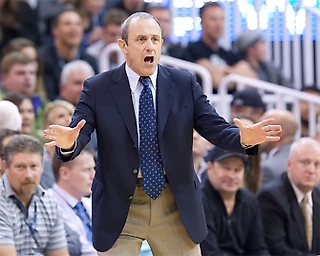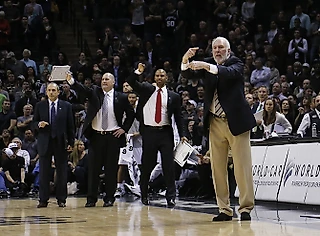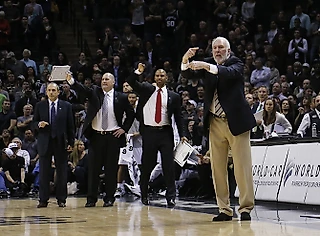Demanding or Praising?
One of the most difficult parts of coaching job is to find balance between being demanding and being able to praise players. This is the biggest challenge for every coach. It is especially difficult for me because I'm often too demanding not only towards my players, but towards myself.
Sometimes a player cannot understand why his coach is so harsh and persistent in trying to get something out of him. Personally, I very rarely leave any of my players alone thinking about him «OK, this guy simply cannot do it». Being demanding has one positive aspect. I do believe that my players have the ability to do it, no matter how difficult it might seem at first. But I also understand that some players might be frustrated by my constant requests of high level performance both in the games and during practices.
I heard many people saying that I've always had good players, thus trying to diminish or question my qualities as a coach. In my opinion, to be a good coach I need good, intelligent players. To me, it sums up the essence of my profession.
The system that I had in Virtus, Benetton, National team of Italy and now I have in CSKA is based on what the Americans call «reading the situation and reacting». If you adopt this kind of system, you immediately admit that you need players with two qualities: a) the intelligence to understand what is going on on the court and b) the ability to do it quickly. You also need players who are not afraid of taking responsibility and making decisions on the court.
The ability to read (understand) the situation is not strictly related to player's talent. Once you read the situation, then you need the talent. If you are a talented player and you can dribble, shoot or pass, this gives you more options to do something in reaction to what you see on the court.
If you are an intelligent player, but not so talented, you should know your limitations and try to use your talent just for what you have. For example, if you are a good shooter, but not a great one-on-one player, after reading the situation, you limit yourself to take a good shot if you have time. But if the defense is running towards you, you pass the ball. You don't force yourself to penetrate. Knowing your limitations, playing through them and not putting yourself into situations you cannot solve are the marks of the highest basketball IQ level.
I never evaluate player's decision based on whether the ball goes through the net or not. We mislead the player if we are satisfied because the ball goes in after bad reading and bad execution. If we do this, the player starts thinking that the only thing that counts is whether the ball goes in, not the ability to read the situation and react in accordance with general rules of our basketball perception. If this happens, it's a tremendous mistake.
On one hand, I know that sometimes I'm too demanding and it may frustrate my players, because it seems like I'm never happy. On the other hand, I can guarantee them that I try to be fair in evaluating their actions on the court: if they read and react properly, according to our concept, I very rarely substitute a player even if he takes two or three good shots and misses them. What scares me is a player shooting because he does not know what to do. Most of the times, it leads to a mistake.
I don't insist that it's the best way to play or coach basketball. It's just my way. However, I respect any other ideas and philosophies. In fact there are many ways, and this is why some players are good for one way or coach and not so good for another.
The main difference between most basketball philosophies lies a) in how much reading of the situation the coach requires and b) to what extent he requires that the reaction of the player would be inline with the options that he gives. It's not a matter of freedom, it's not a matter of better or worse. It's easier for some players to go with less reading and to have limited number of options so that they have fewer chances to get confused.
Sometimes players show us new options thanks to their talent. Great players can create new options, so you have to be ready to pick them up. Here is another problem. Some players are good at reading, but if others are not, you need to do something to coordinate both groups. If the player, who reads the defense and reacts every time in a different way, is not understood by his teammates, he is perceived like a major cause of chaos. Other players simply get confused. So you always have to find the balance in how many options you can let your players have in their reading.
The number of options a player can see depends on his experience and his basketball background. If a player grew up in a system where finding the correct space, correct position on the court and the timing of the action were emphasized, usually, he has a very good ability to read the situation and react. If a player grew up in a strict system, it's more difficult for him.
It works exactly the same way with parents bringing up a child. If a child grows up in a system where taking individual responsibility was emphasized the more he grows up, the more responsibility he takes. It's just a metaphor of life.
This is why thorough selection of players is so important. A player, that may be good for my system, may be not as good for another coach, and vice versa. It's not just a matter of a player fitting in the system, it's also a matter of the system adjusting to the player. This is why I almost never rely on the opinion of other coaches while deciding whether to sign any particular player or not. I'd rather sit and talk with him, and see how he reacts to what I say and how he perceives basketball. All experienced coaches can understand if a player of a certain kind is good for their way of coaching or not.
It explains why some players that had a big role under one coach might find it difficult to have the same role and to perform at the same level under the next coach who takes over the team.
Coach's job is to help his players to learn how to read different situations. Besides that, you can either use your players for what they can do or you can try to improve their abilities. As I coached young players for many years, I do believe you can improve even veteran players and I prove it by doing it even with players who are 30 years old.
However I respect coaches who do differently, because there are some players who believe differently. There are players who prefer to be used for what they are capable to do, because it doesn't break their confidence. Let me give you an example. Imagine you are a good player, maybe a famous player, and I ask you to do something in a different way and you don't manage to do it right. It may break your confidence. You might feel that I'm not using you well, that I'm not helping you.
You need to be strong to play or work for somebody who pushes you to perform well day in and day out, and who rarely praise you for your good job. It's like having a father who is too demanding and keeps saying that you could have done better.
Players, especially young ones and those who grew accustomed to be praised for every slight improvement, might find it difficult to play in my system and would get frustrated by the fact that for me they are never good enough. But there is nothing I can do about it. I cannot force myself to be nice. I prefer to be straightforward.
I realize that sometimes I'm not so good at understanding when my team needs to be supported, to be praised for its efforts even if something is not going the right way. However I've been very lucky as most of my players understood that I rarely praised them for their good results or effort, because I was even more demanding towards myself.
Honestly, I'm almost never satisfied with the way I coach the team. Many people think that when I say something like I said the night after playing with Lottomatica — «it was my responsibility that the team played so badly tonight» — it's just a trick to relieve pressure. But those who have known me for a long time understand that I said exactly what I meant.
I believe that I wasn't doing the right things back then. I didn't prepare my team well. I wasn't able to help them to stay a little bit more relaxed. Due to continuous changes in our roster I, myself, was confused what would be the best options for us. Now I feel that we managed to make sure everybody knows what they have to do.
For example, what Goree does when he's playing with Andersen, especially in offense, differs greatly from what he has to do when he plays with Van Den Spiegel. Van Den Spiegel is a player who always goes inside, and Andersen is a player who might also go outside. So Goree has to adjust his position. But if you don't make it clear to your players and you don't work on this, you might find yourself in a situation when the two will be going out and we'll have nobody inside thus making our offense completely unbalanced. Plus the perimeter players won't know what to do as they won't have a point of reference inside.
It's all about little things. Everybody knows that there is a psychological chemistry in the team that defines how players relate to each other. But there is also a technical chemistry which is even more important, as it defines how comfortable is for the players to stay on the court together. In the end, all players like to play, have fun and win. So if we don't have a very good technical chemistry, we will find it difficult to stay together and have good relationships.
Sometimes changing positions for one-two meters makes a really big difference. It makes a pass impossible. There was a play with Lottomatica early in the game when JR passed the ball to David Andersen and the ball was intercepted and they had a fast break. When watching the tape, it was clear that the two didn't find right positions because they were not sure where to go. So this is my responsibility to make those things clear, to make the game easier for my players. If I don't make the game easier for them, they might get confused. It's a tremendous responsibility because now their reading ability will be in a terrible danger, it can even be destroyed.
Most of the times I'm not very happy with what I'm doing. Sometimes I even need to force myself not to change the system too often. But there are moments when I need to change it to create the situation for the player. So it's difficult for me to find the balance. The good thing is that my players recognize that I always keep in mind making our team better. It's not that I make changes for the sake of changes.
At the end of this post I want to share an interesting observation. As you probably know a Sports Illustrated columnist Ian Thomsen came to Kazan for a Russian Cup games to write a 24-pages story about CSKA. It's the second time a Sports Illustrated guy visits me, first was Alexander Wolff when my Virtus played against Fortitudo, and both times my teams lost. It's interesting to be followed by the reporters from Sports Illustrated, but I do hope that the next time they will bring good luck with them.




